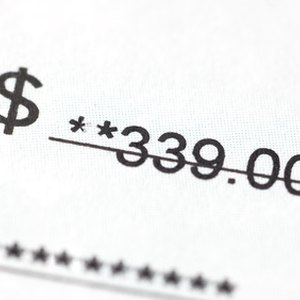
Sometimes, circumstances may interfere with your ability to deposit or cash checks promptly. So, before you finally head to the bank, you might wonder, "How long is a check good for?"
The Uniform Commercial Code (UCC) – a set of laws that, among other things, applies to checks – states that banks don’t have to accept a check that is dated more than 180 days beyond the issue date. However, longer or shorter periods may apply for different types of checks. If in doubt, it’s a good idea to contact your financial institution before depositing an old, uncashed check.
Know the Expiration Rules for Different Checks
There are many types of checks, and they don’t all have the same expiration rules. Knowing the expiration time frame can help you preserve your rights if you must deal with an old check.
Personal Checks
According to the Cornell Law School Legal Information Institute, the UCC six-month rule applies to personal checks. Banks and credit unions will honor personal checks 180 days after the check date. However, you might wonder, "When do personal checks expire if they're undated?" In that case, banks must treat the date on which the check came into the payee’s possession as the check date.
U.S. Treasury Checks
U.S. Treasury checks – including IRS tax refund payments – have a one-year check expiration date, explains the Bureau of the Fiscal Service. If you possess an expired Treasury check that is more than 12 months old, you must contact the federal agency that authorized the check’s payment. It will issue you a new check, but you should verify that the Treasury has your current address.
Company-Printed Checks
Business checks, including payroll checks, are routinely sent to payees on a timely basis. These checks are printed by the issuing company in-house or through a third party. They are usually good for six months, but check writers may try to shorten their exposure by printing “Void after XX days” on the check.
State laws govern the enforceability of early expiration notices, so you may have to check with your local attorney general or secretary of state. If you deposit a date-limited check after the void date, the payer may decide not to honor it, perhaps precipitating legal action.
Cashier’s and Certified Checks
These are checks in which a bank has verified sufficient funds in the payer’s bank account. Banks move the funds for a cashier’s check to their own accounts, whereas they put a hold on the payer’s account for a certified check’s amount to help guarantee sufficient funds.
Technically, these checks never expire, but a state’s “escheatment rules” for unclaimed property govern when banks must send stale checks to the state treasurer (typically, three to five years after the check date). The National Association of Unclaimed Property Administrators has a list with state information including links to each state's unclaimed property site and contact details.
Money Orders and Traveler’s Checks
Neither of these payment types expire. You should be able to cash or deposit these at any time. But a state’s escheatment rules may apply when these payments aren’t cashed for three or more years.
Waiting Can Be Risky
The problem with an old check is that the check writer’s account might have insufficient funds to cover it. The risk that an aged check will bounce is one of the main reasons why expiration rules exist. Personal checks are the riskiest, as the payee may have closed or overdrawn the account since writing the check. Presumably, most companies and government agencies have continuing operations and are less likely to be caught short when a person cashes an old check.
Handling an Expired Check
A payee should ask the issuer to rewrite an expired check or advise the issuing bank to honor it. If that isn’t possible, you can ask your bank to see if it will accept the check. Your bank may decide to do so after verifying the funds are in the payer’s checking account.
However, keep in mind that banks need not honor stale checks. If an old check bounces after you cash it, your bank will attempt to reclaim the money from your account and may impose a bounced check fee.
References
Writer Bio
Eric Bank is a senior business, finance and real estate writer, freelancing since 2002. He has written thousands of articles about business, finance, insurance, real estate, investing, annuities, taxes, credit repair, accounting and student loans. Eric writes articles, blogs and SEO-friendly website content for dozens of clients worldwide, including get.com, badcredit.org and valuepenguin.com. Eric holds two Master's Degrees -- in Business Administration and in Finance. His website is ericbank.com.

